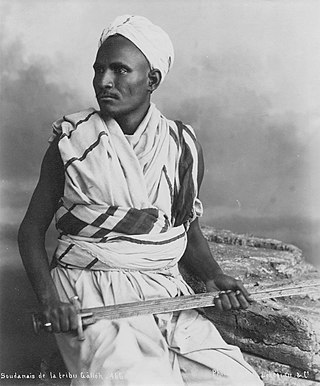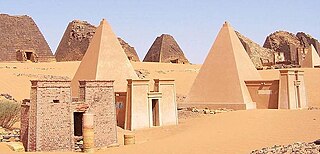This is a list of commercial banks in Sudan, as updated by late 2024 by the Central Bank of Sudan. [1]
Al Jazeera Sudanese Jordanian Bank

Sudan, officially the Republic of the Sudan, is a country in Northeast Africa. It borders the Central African Republic to the southwest, Chad to the west, Libya to the northwest, Egypt to the north, the Red Sea to the east, Eritrea and Ethiopia to the southeast, and South Sudan to the south. Sudan has a population of 50 million people as of 2024 and occupies 1,886,068 square kilometres, making it Africa's third-largest country by area and the third-largest by area in the Arab League. It was the largest country by area in Africa and the Arab League until the secession of South Sudan in 2011; since then both titles have been held by Algeria. Sudan's capital and most populous city is Khartoum.

The history of Sudan refers to the territory that today makes up Republic of the Sudan and the state of South Sudan, which became independent in 2011. The territory of Sudan is geographically part of a larger African region, also known by the term "Sudan". The term is derived from Arabic: بلاد السودان bilād as-sūdān, or "land of the black people", and has sometimes been used more widely referring to the Sahel belt of West and Central Africa.

The rich and varied music of Sudan has traditional, rural, northeastern African roots and also shows Arabic, Western or other African influences, especially on the popular urban music from the early 20th century onwards. Since the establishment of big cities like Khartoum as melting pots for people of diverse backgrounds, their cultural heritage and tastes have shaped numerous forms of modern popular music. In the globalized world of today, the creation and consumption of music through satellite TV or on the Internet is a driving force for cultural change in Sudan, popular with local audiences as well as with Sudanese living abroad.

Equatoria is the southernmost region of South Sudan, along the upper reaches of the White Nile and the border between South Sudan and Uganda. Juba, the national capital and the largest city in South Sudan, is located in Equatoria. Originally a province of Anglo-Egyptian Sudan, it also contained most of northern parts of present-day Uganda, including Lake Albert and West Nile. It was an idealistic effort to create a model state in the interior of Africa that never consisted of more than a handful of adventurers and soldiers in isolated outposts.

Wad Madani, Wad Medani or Madani is the capital of the Al Jazirah state in east-central Sudan. Wad Madani lies on the west bank of the Blue Nile, nearly 85 miles (136 km) southeast of Khartoum. It is linked by rail to Khartoum and is the center of a cotton-growing region. The city is also the center of local trade in wheat, peanuts, barley, and livestock. It is also headquarters of the Irrigation Service. In 2008, its population was 345,290. It is the home of the Al Jazirah University, the second biggest public university in Sudan. It also has Wad Medani Ahlia University, a private university.

The Merowe Dam, also known as Merowe High Dam, Merowe Multi-Purpose Hydro Project or Hamdab Dam, is a large dam near Merowe Town in northern Sudan, about 350 kilometres (220 mi) north of the capital Khartoum. Its dimensions make it the largest contemporary hydropower project in Africa. It is situated on the river Nile, close to and inundating the 4th Cataract where the river divides into multiple smaller branches with large islands in between. Merowe is a city about 40 kilometres (25 mi) downstream from the construction site at Hamdab. The main purpose for building the dam was the generation of electricity.

The Ja'alin, Ja'aliya, Ja'aliyin or Ja'al are a tribal confederation and an Arab or Arabised Nubian tribe in Sudan. The Ja'alin constitute a large portion of the Sudanese Arabs and are one of the three prominent Sudanese Arab tribes in northern Sudan - the others being the Shaigiya and Danagla. They trace their origin to Ibrahim Ja'al, an Abbasid noble, whose clan originally hailed from the Hejaz in the Arabian Peninsula and married into the local Nubian population. Ja'al was a descendant of al-Abbas, an uncle of Muhammad. The Ja'alin formerly occupied the country on both banks of the Nile from Khartoum to Abu Hamad. According to a source, the tribe allegedly once spoke a now extinct dialect of Nubian as late as the nineteenth century. Many Sudanese politicians have come from the Ja'alin tribal coalition.
The Government of Sudan is the federal provisional government created by the Constitution of Sudan having executive, parliamentary, and the judicial branches. Previously, a president was head of state, head of government, and commander-in-chief of the Sudanese Armed Forces in a de jure multi-party system. Legislative power was officially vested in both the government and in the two houses – the National Assembly (lower) and the Council of States (upper) – of the bicameral National Legislature. The judiciary is independent and obtained by the Constitutional Court. However, following the Second Sudanese Civil War and the still ongoing genocide in Darfur, Sudan was widely recognized as a totalitarian state where all effective political power was held by President Omar al-Bashir and his National Congress Party (NCP). However, al-Bashir and the NCP were ousted in a military coup on April 11, 2019. The government of Sudan was then led by the Transitional Military Council (TMC). On 20 August 2019, the TMC dissolved giving its authority over to the Transitional Sovereignty Council, who were planned to govern for 39 months until 2022, in the process of transitioning to democracy. However, the Sovereignty Council and the Sudanese government were dissolved in October 2021.

The Central Bank of Sudan is the central bank of Sudan. The bank was formed in 1960, four years after Sudan's independence. It is located in the capital Khartoum. In April 2023, the Central Bank's headquarters was destroyed during the Sudanese civil war (2023-present).

Sudanese Arabs are the inhabitants of Sudan who identify as Arabs and speak Arabic as their mother tongue. Sudanese Arabs make up 70% of the population of Sudan, however prior to the independence of South Sudan in 2011, Sudanese Arabs made up only 40% of the population. They are Sunni Muslims and speak Sudanese Arabic.

Bank of Khartoum (BOK), is the largest bank in Sudan. With some 111 or more branches, it is also the commercial bank with the oldest continuous history in the country. The largest single shareholder is Dubai Islamic Bank. In 2011, the government of the United States of America lifted its sanctions on Bank of Khartoum. The US Treasury’s Office of Foreign Assets Control posted a notice on its website that it had removed Bank of Khartoum from the blacklist, meaning Bank of Khartoum could seek the return of blocked assets and resume limited dealings with U.S. financial institutions. However, in March 2014, several European and Saudi Arabian banks announced that they would cease transacting with Bank of Sudan.
Energy in Sudan describes energy and electricity production, consumption and imports in Sudan. The chief sources of energy in 2010 were wood and charcoal, hydroelectric power, and oil. Sudan is a net energy exporter. Primary energy use in Sudan was 179 TWh and 4 TWh per million persons in 2008.
The following is a timeline of the history of the city of Khartoum, Sudan.

The Rapid Support Forces is a paramilitary force formerly operated by the government of Sudan. The RSF grew out of, and is primarily composed of, the Janjaweed militias which previously fought on behalf of the Sudanese government. Its actions in Darfur were deemed crimes against humanity by Human Rights Watch.
Banking in Sudan covers the history, development and structure of banking in the Sudan. From the inheritance of the banking system from the Anglo-Egyptian Sudan to the establishment of the Sudan central bank in 1959 and development of Islamic banking in the mid 1970s.
Events in the year 2021 in Sudan.

The visual arts of Sudan encompass the historical and contemporary production of objects made by the inhabitants of today's Republic of the Sudan and specific to their respective cultures. This encompasses objects from cultural traditions of the region in North-East Africa historically referred to as the Sudan, including the southern regions that became independent as South Sudan in 2011.

The architecture of Sudan mirrors the geographical, ethnic and cultural diversity of the country and its historical periods. The lifestyles and material culture expressed in human settlements, their architecture and economic activities have been shaped by different regional and environmental conditions. In its long documented history, Sudan has been a land of changing and diverse forms of human civilization with important influences from foreign cultures.